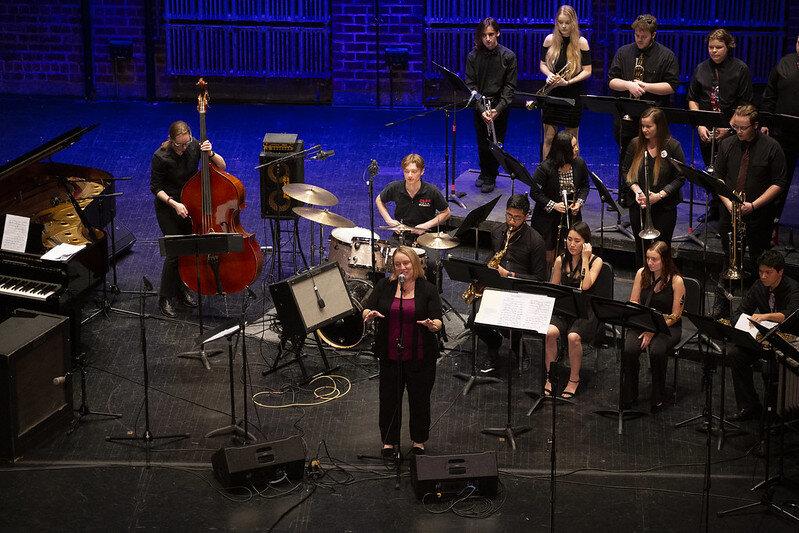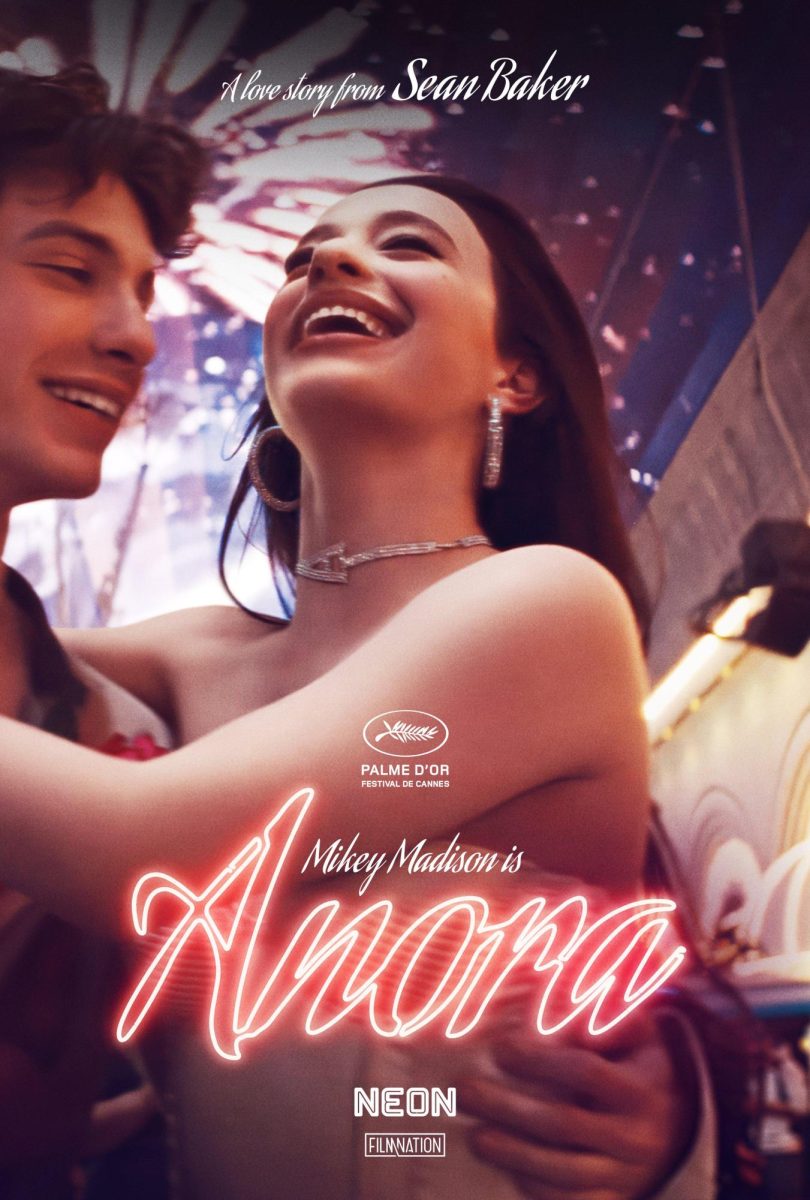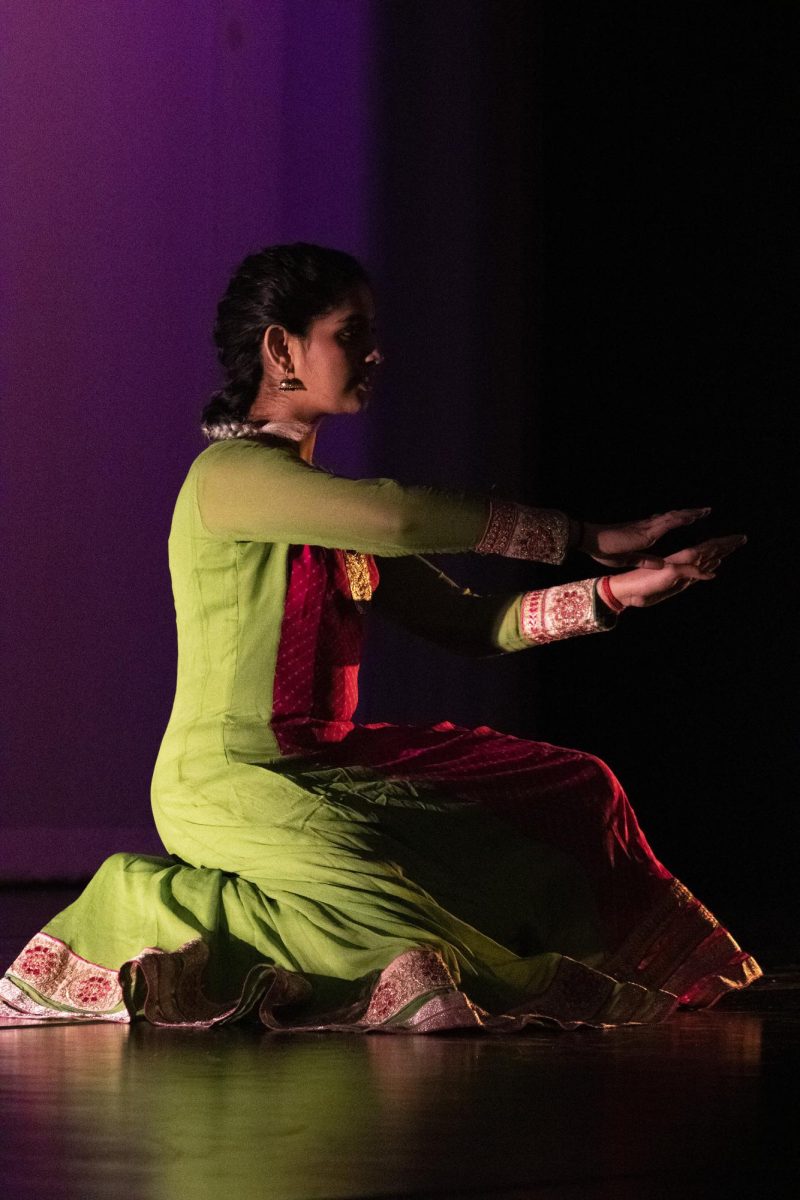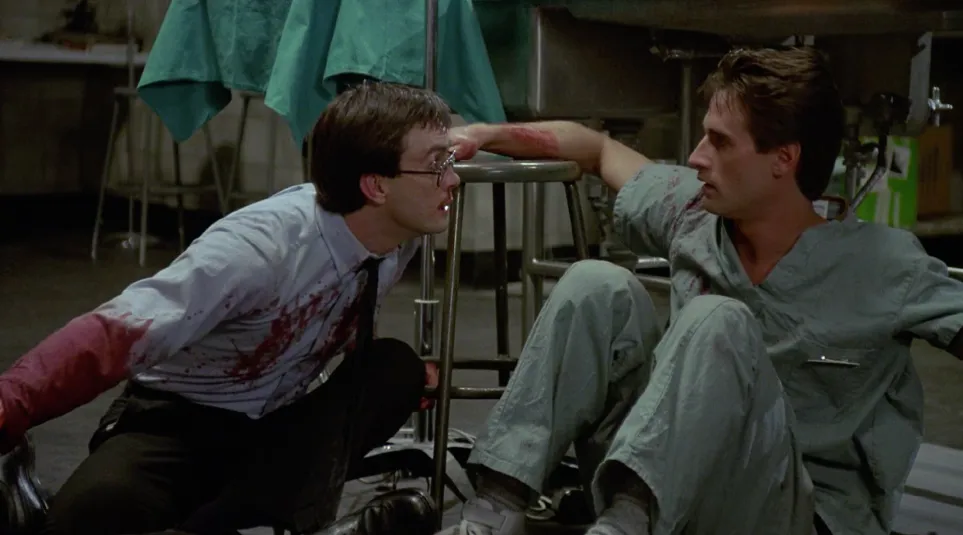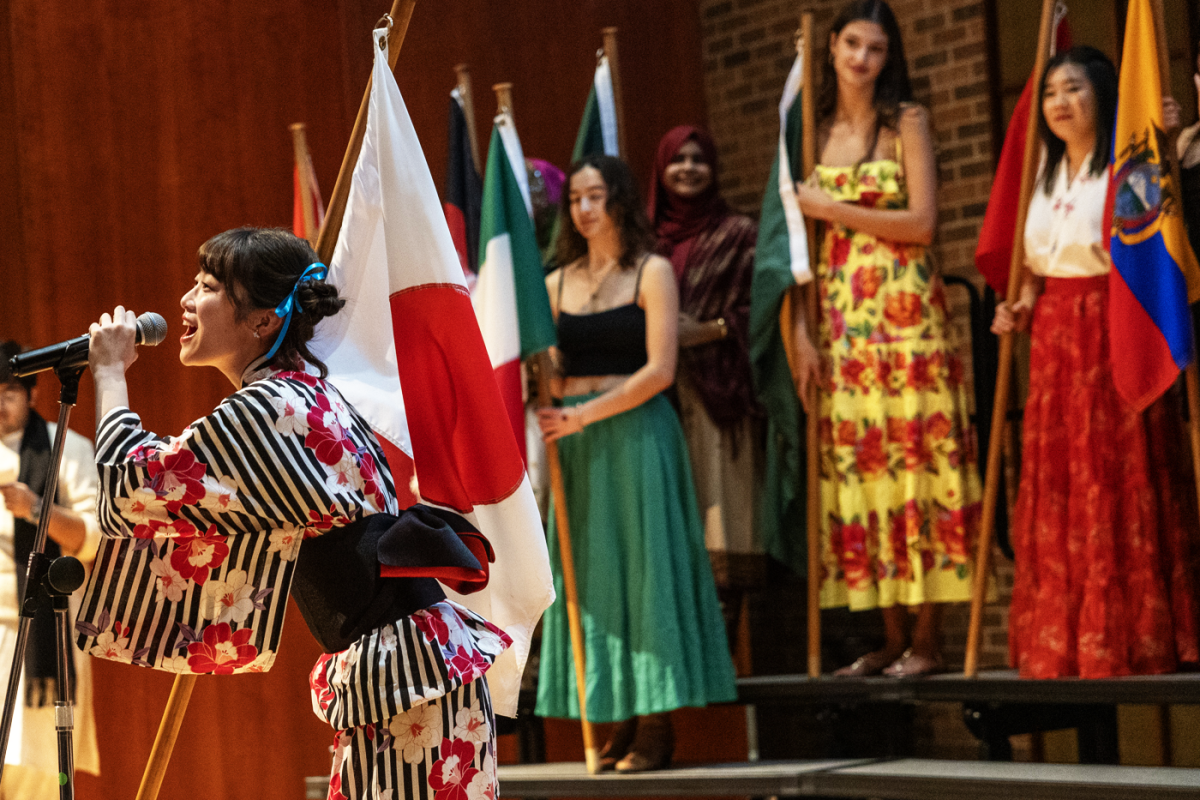Nikki Malley addressing an audience at the Orpheum Theater for the Jerome Mirza Residency concert of 2019. Daniel Bien is in the bottom left corner. (Courtesy of Knox Flickr)
The inability to host in-person musical residencies has diluted the student experience, yet also made it more accessible to the general public. With COVID-19 ever-present, the Jazz Studies Program at Knox is working to overcome unpredictable obstacles to keep music alive through their ongoing residency programming.
For the last eight years, the Jerome Mirza Foundation has funded an annual music residency at Knox in memory of the jazz lover, Illinois lawyer Jerome Mirza, for whom the foundation was named and whose daughter is a Knox alumna. The residency will typically bring in a renowned artist, with whom the student musicians work one on one over the span of the week, ending in the performance of a specially curated composition. In 2021, however, the music department is hosting not one, but seven artists over a span of five months. With each artist compiling a two hour online workshop on a Sunday rather than the traditional week’s worth of interactive instruction, this year’s series is sampling multiple diverse approaches to jazz rather than deep diving into one.
Director of the Jazz Studies program Nikki Malley emphasized that having artists from a variety of social identities and musical interests was an important part of the decision making process, wherein a pool of fifty two skilled applicants had to be cut down to seven residency artists. The selection process involved input from Malley, Managing Director of Jazz Studies Andy Crawford and a few student musicians from various different musical groups.
“[Jazz is] an international music now, so it was really important to us that the group of artists that we had for the residency reflected both the diversity of artists that are in the jazz world and also the diversity of artists we would like to see in the jazz world,” said Malley.
The first musical sampling came at the end of January from Chilean jazz artist Camila Meza. A skilled guitarist, vocalist and composer, she gave a presentation on storytelling through music and improvisation. As a jazz guitarist of the Cherry Street Combo, the premier jazz group on campus, freshman Brandon Roberts utilized an opportunity to meet with a residency artist for one on one instruction. Roberts met with Meza via Zoom during the winter midterm break.
“I loved her whole vibe and I wanted to talk to her,” said Roberts. “I told her what I wanted to work on, and we worked on that for like 45 minutes, and then we just talked about jazz and music and et cetera. And then it was over and it was really great… She was lovely, she’s a wonderful person, and she’s just a hell of an artist and an incredible guitarist.”
The adjusted format of the residencies make it possible for artists to give presentations from all over the country and the world. The second residency artist, Amir ElSaffar, zoomed in from Brooklyn to talk about how he bridges contemporary jazz with the Iraqi maqam tradition, using instruments such as the trumpet, the santur and his voice. ElSaffar’s presentation was of particular interest to junior Daniel Bien, a saxophonist, who has fascinations with Byzantine era music within his experiences from his Greek Orthodox background.
“He incorporated Iraqi Byzantine era music, which I thought was very interesting to incorporate into jazz. I knew a lot of the history of the empire of Babylon, so a lot of the traditional music that was played there,” said Bien. “Incorporating his roots in the Middle East and Iraqi area is just extremely interesting and he’s the first artist I’ve heard that concentrates in that area.”
With a few years in the music department under his belt, Bien is attuned to the differences between this year’s residencies and those of the past. He notes the intimacy between the residency artists and student musicians as a distinct loss because of the pandemic. In tandem, the campus’s jazz groups would have intensive sessions individually and in groups where the guest resident would critique, direct or play alongside them throughout the residency week. By the end of the week, they would perform a full on concert at the Orpheum Theater with the artist. Besides being much less of a time commitment, Bien noted a few other positive outcomes in spite of the residencies’ abbreviated format.
“Anyone is welcome, it’s free and public to the Knox community and to the people who don’t live in the Knox area,” said Bien. “They talk in very general terms to make jazz seem appealing, even to people who don’t like jazz. They have a Q&A session afterward for their presentation and it’s really open to anything.”
Nikki Malley felt that the traditional residency experience would be impossible to replicate, which inspired the jazz program to take an entirely different approach. To abide COVID-19 guidelines, the music program has had to work through significant limitations, especially as many orchestral instruments require the use of a mouthpiece, and thus are not mask accommodating. The largest campus orchestra, nicknamed the “Big Band,” used to practice three times a week for up to two hours. During last term they had to split the band in half, where each group could only practice, socially distanced, once a week for thirty minutes. Though increased testing for winter and spring terms at Knox has allotted them to join the halves again with a bit more practice time, the time they have to develop as a group has still been significantly stifled from what most student musicians are used to.
“We wanted to do something that served a couple different purposes, one was to give the Knox students in the jazz and music program more broadly some ongoing engagement with music since many of them have little to no ability to actually make music right now and certainly not to make music together,” said Malley.
Another annual event hosted by the jazz studies program is the Winter Jazz Series, which traditionally takes place in January. Instead, the artist contracted for this event, Jeremy Cunningham, will perform in May as the seventh and culminating Jerome Mirza residency artist. Malley hopes to have this event in the format of an outdoor concert where members of the community can attend, though is planning for contingencies. Malley is especially grateful to retain this guest, whom the department had arranged to perform a year in advance.
“[Cunningham’s project is] really about gun violence and the ripple effect that gun violence has on the people it affects and also bigger community political-social issues…The fact that we’re able to [host Cunningham] in spite of all this is great,” said Malley. “I think it’s an important thing people need to hear. It’s actually a very hopeful project. It’s beautiful, hopeful music about loss and grief, but also what it means to love someone.”
All the residency workshops are premiered live and uploaded on the Knox College Youtube channel available to the general public. More information about the featured artists can be found below. The Jerome Mirza jazz residency is ongoing on certain Sundays from now until May.

